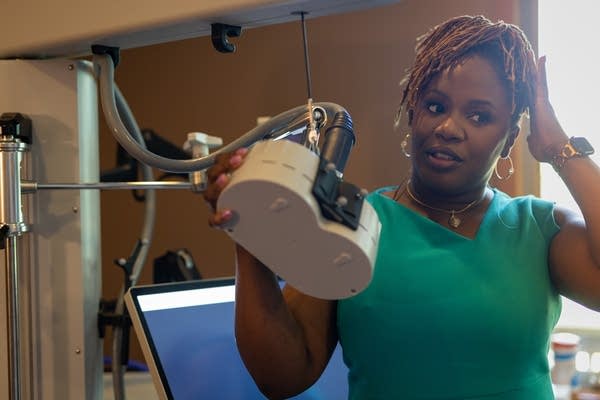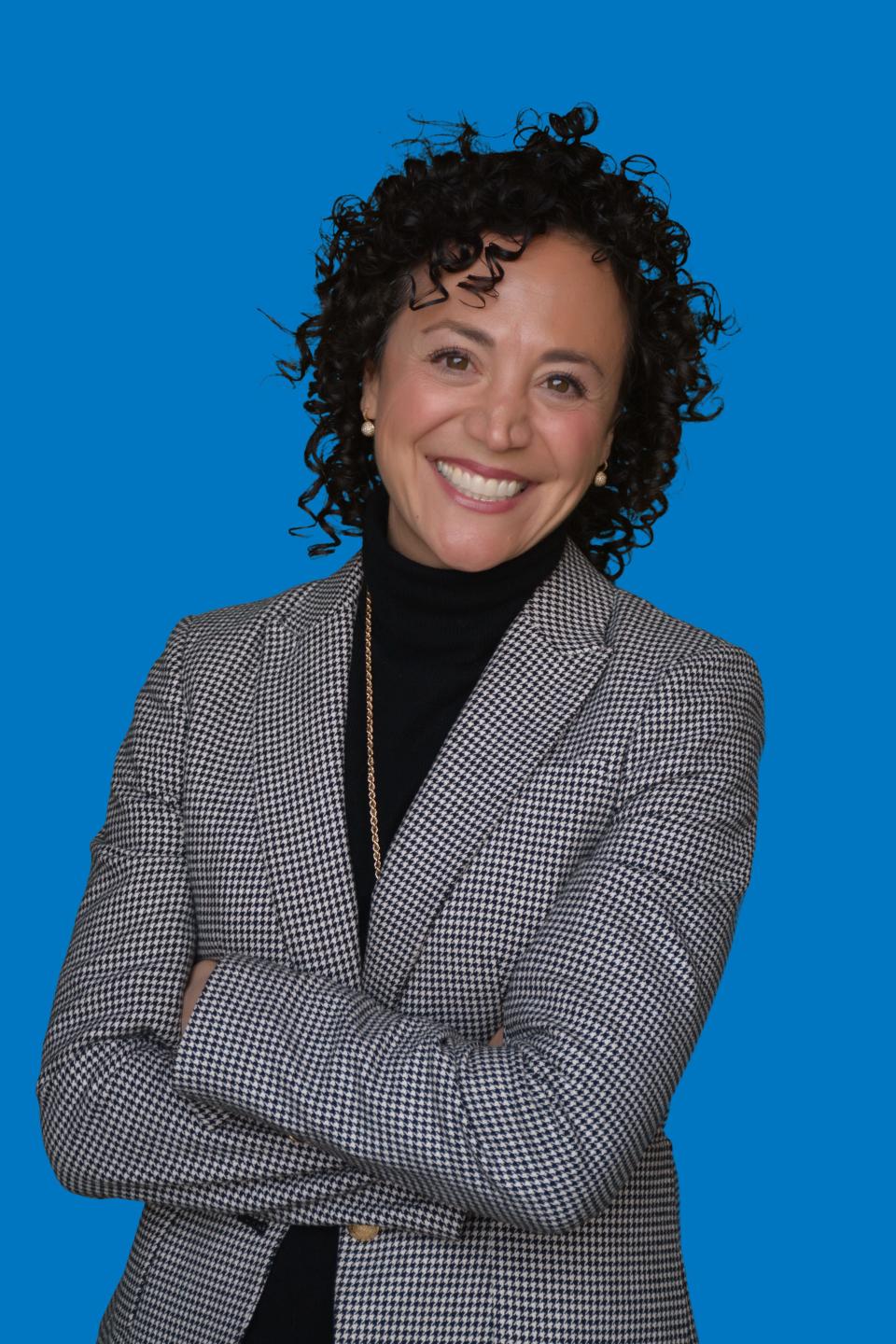
Practitioner works to erase stigma some Black Minnesotans feel about mental health care
In Sept. 2019, Adejoke Adedeji created Nexus of Hope, a psychiatric clinic in Lakeville, Minn., offering a wide range of services from talk therapy to transcranial magnetic stimulation (TMS), medication-assisted treatment and telehealth.
When the COVID pandemic struck in 2020, she thought business might slow down.
She was wrong.
“Things got even busier, as we know, you know, a lot of people experience a lot of anxiety and stress during COVID,” she said.
MPR News is supported by Members. Gifts from individuals power everything you find here. Make a gift of any amount today to become a Member!
The psychiatric nurse practitioner said during the height of COVID-19 and the justice movement following the murder of George Floyd by a Minneapolis police officer, she saw more people of color who felt agitated, had questions and were searching for someone who could understand them and share their cultural experiences.
Nexus of Hope founder Adejoke Adedeji works at her desk in the company’s Lakeville, Minn., offices on Sept. 5.
Ben Hovland | MPR News
Adedeji, who was born in the U.S. but grew up in Nigeria, says while there’s been progress, there are still too many people in African immigrant communities who feel too stigmatized by their mental health concerns to seek help. And she says even health privacy laws don’t ease their concerns.
“They are still concerned that things are too close to home,” she said. “So sometimes that is not what they seek out. If they do seek out help, they aren’t seeking out somebody within their culture.”
Adedeji says her own experiences have helped her connect with the people she helps.
She originally went to school with plans on becoming a creative writer — but plans changed once she experienced first-hand the impact of mental illness. In 2010 she lost a cousin to suicide and later that year her youngest brother died very suddenly.
“And so that was very, very hard for the entire community, especially since we really hadn’t been hit with death with young people before,” she said.

Uplifting messages line the walls inside Nexus of Hope’s Lakeville, Minn., clinic on Sept. 5, a little over a year after moving to its new, larger building.
Ben Hovland | MPR News
Adedeji says that experience taught her quickly about the lack of support in her community when it comes to suicide and illness.
She made it a goal to remove the stigma by validating people’s experiences.
“And really exploring all those feelings and knowing that your feelings are valid, and you don’t have to repress them, or hide them,” she said.
Adedeji went on to get her master’s degree in public health from Florida International University, before earning a Master of Science in Nursing at the University of Tennessee.
Now, she’s helping patients across the country find their voice and a treatment plan.
Colin Skerrett, 28 from Eden Prairie, Minn., says one of his parents is Black and the other is white. He says seeking treatment for his addiction and anxiety was not an easy journey — until now.
“Honestly, the way [Adedeji] was able to understand me and both coming from a background that was not your traditional kind of American upbringing really helped,” he said. “There were a lot of similarities that just in my day to day life that were actually kind of big points of contention at that point in time, she was able to understand and appreciate.”
Olushola Olukoga, 28, has also struggled with anxiety and depression for years. Born in Nigeria, Olukoga said the COVID-19 pandemic was her breaking point. After years of feeling shame for her battle with mental health, she says treatment has been liberating — thanks in big part — to finding a Nigerian therapist.

Transcranial magnetic stimulation machines, pictured at Nexus of Hope’s Lakeville, Minn., clinic Sept. 5, use a magnetic field to stimulates nerve cells.
Ben Hovland | MPR News
“There were so many times I almost lost my life because of shame, instead of choosing to get proper help,” said Olukoga.“So seeing someone who grew up within those cultural restraints, those conflicts, and not only grew up in it, but like a professional, it did a lot for me, more than [Adedeji] would ever know.”
Olukoga says it was a specific moment during her first time meeting with Adedeji that assured her she found the right therapist. She says it was when Adedeji was open and honest about her own mental health journey, including taking medication and going to therapy.
Olukoga said that helped calm some of her fears about getting psychiatric treatment.
“Like, are they using me for some kind of experiment? Are you doing stuff for fun? But the fact that she helps people and is not afraid to get help herself if and when she needs it,” Olukoga said.
According to the National Alliance on Mental Illness, people of color are less likely to receive mental health services compared to those who are white. In 2021, only 39.4 percent of Black or African Americans with mental illness accessed treatment, compared to 47.2 percent of all U.S. adults.

Adejoke Adedeji demonstrates the TMS machine at the clinic on Sept. 5. It is used to treat symptoms of depression, OCD and smoking cessation.
Ben Hovland | MPR News
State lawmakers passed legislation in 2022 to build and reform mental health care systems — including an act that creates a grant program for mental health providers who have at least 25 percent of their clients on public insurance or a sliding fee and who primarily serve underrepresented communities.
Lawmakers also enacted a policy that establishes a juvenile court guardianship program for at-risk youth.
Adedeji knows people are more likely to seek help if they think their provider can empathize with their background and cultural differences.
“I’m not saying the problem is going to be fixed right away, or that I have any magic bullet,” she said. “But what can I do today to help ease that suffering? For some people, it is medication; for some people, it’s direction. For some people, it is just normalizing their experiences and letting them know that I’m here.”
The most recent National Alliance on Mental Illness report shows three in 10 adults reported symptoms of anxiety or depression in Feb. 2022, compared to a rate of one in 10 in Jan. 2019.
The report also marks 2022 as a mental health milestone — with the launch of the 988 Suicide and Crisis Lifeline.
If you or someone you know is in crisis or thinking about suicide, call or text 988 to reach the Suicide and Crisis Lifeline.







